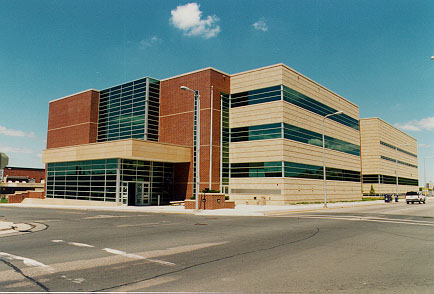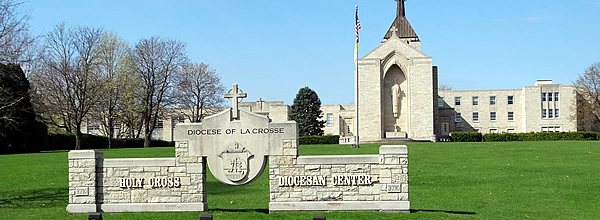

La Crosse County
Law Enforcement Center
333 Vine St - Suite 1730
La Crosse, WI 54601
fax: 608-793-6517
office: 608-785-9638
Non-office hours and
Emergency: 608-785-9634
email:
Medical Examiner Office
 | Medical Examiner |
Mission Statement:
The La Crosse County Medical Examiner exists to be of service to the citizens of La Crosse County. The office is dedicated to the protection of the living, through comprehensive investigation of deaths, as required by law.
In case of death, report: Office Hours (08:00 AM - 04:00 PM): 608-785-9638, Non-Office Hours: 608-785-9634
The office of the La Crosse County Medical Examiner is established by and operates under provisions of the Wisconsin State Statutes and Administrative Rules. The La Crosse County Medical Examiner has established procedures for reporting deaths in accordance
with Wisconsin State Statutes 59, 69, 979, and the DHSS Rules 131 and 135. Cases which must be reported.
Pursuant to state statute 979.01, deaths meeting the requisite criteria must be immediately reported to the La Crosse County Medical
Examiner. In cases where jurisdiction for a death may rest with another County, the La Crosse County Medical Examiner's Office will notify the appropriate agency.
979.01 Reporting deaths required; penalty; taking specimens by coroner or medical examiner.
(1) All physicians, authorities of hospitals, sanatoriums, public and private institutions,
convalescent homes, authorities of any institution of a like nature, and other persons having knowledge of the death of any person who has died under any of the following circumstances, shall immediately report the death to the sheriff, police chief,
or medical examiner or coroner of the county where the death took place:
(a) All deaths in which there are unexplained, unusual or suspicious circumstances.
(b) All homicides.
(c) All suicides.
(d) All deaths following an abortion.
(e) All deaths due to poisoning, whether homicidal, suicidal or accidental.
(f) All deaths
following accidents, whether the injury is or is not the primary cause of death.
(g) When there was no physician, or accredited practitioner of a bona fide religious denomination relying upon prayer or spiritual means for
healing in attendance within 30 days preceding death.
(h) When a physician refuses to sign the death certificate.
(i) When, after reasonable efforts, a physician cannot be obtained to sign the
medical certification as required under s. 69.18 (2) (b) or
(c) within 6 days after the pronouncement of death or sooner
under circumstances which the coroner or medical examiner determines to be an emergency.
(1g) A sheriff or police chief shall, immediately upon notification under sub. (1) or s. 948.23 (1) (b) of a death, notify the coroner or the medical examiner, and the coroner or medical examiner of the county where death took place, if the crime, injury, or event
occurred in another county, shall immediately report the death to the coroner or medical examiner of that county.
(1m) The coroner or medical examiner receiving notification under sub. (1) or (1g) shall
immediately notify the district attorney.
(1r) If the coroner or medical examiner is notified of a death under sub. (1) or (1g) and
determines that his or her notification of the death was not required under sub. (1) or
(1g), he or she shall notify the director of the historical society under s. 157.70 (3).
(2) Unless s. 948.23 (1) (b) applies,
any person who violates this section shall be fined not more than $1,000 or imprisoned not more than 90 days.
(3) In all cases of death reportable under sub. (1) or s.
948.23 (1) (b) where an autopsy is not performed, the
coroner or medical examiner may take for analysis any and all specimens, body fluids and any other material which will assist him or her in determining the cause of death. The specimens, body fluids and other material taken under this subsection
shall not be admissible in evidence in any civil action against the deceased or the deceased's estate, as the result of any act of the deceased.
(3m) In all cases of death reportable under sub.
(1) or s.
948.23 (1) (b) where an autopsy is not performed,
the coroner or medical examiner shall take for analysis any and all specimens, body fluids and any other material that will assist him or her in determining the cause of death if requested to do so by a spouse, parent, child or sibling of
the deceased person and not objected to by any of those family members. The specimens, body fluids and other material taken under this subsection shall not be admissible in evidence in any civil action against the deceased or his or her estate,
as the result of any act of the deceased.
(4) No person may embalm or perform an autopsy on the body of any person who has died under any of the circumstances listed in this section or on the body
of any person whose death has been reported under s. 948.23 (1) (b) unless
the person obtains the written authorization of the coroner of the county in which the injury or cause of death occurred. Such authorization shall be issued by the coroner or a deputy within 12 hours after notification of the reportable death,
or as soon thereafter as possible in the event of unexplained, unusual or suspicious circumstances.
History: 1973 c. 272; 1975 c. 294,
421; 1979 c. 221; 1983 a. 279 ss.
8, 22; Stats. 1983 s. 979.01; 1985 a. 315, 316;
1989 a. 121;
1993 a. 486; 1999 a. 85; 2001 a. 38;
2011 a. 268.
Cross-reference: See also s. DHS 135.09,
Wis. adm. code.
Admission of a blood sample is not barred by sub. (3) when the action is brought by the deceased's estate. Luedtke v. Shedivy, 51 Wis. 2d 110, 186 N.W.2d 220 (1971).
If an accident occurs in one county and the victim is transported to another county, and death occurs there, the
coroner where the death occurs has a duty to immediately report the death to the coroner of county where the crime, injury, or event occurred, and the coroner of the latter county has authority to investigate and a duty to hold
an inquest if he or she considers it necessary or if directed by the district attorney of his or her county. 62 Atty. Gen. 127.
In the event of a mass fatality:

In the event of a mass fatality, La Crosse County has designated a Family Assistance Center, located at the Diocese of La Crosse, 3710 East Ave South, La Crosse WI. The Family Assistance Center will be the gathering location to obtain all information
on your family member. Law Enforcement, hospital representatives, counselors, clergy and funeral home representatives will all be available at this location. At the time of the incident, a telephone number will be posted on this site for you to call.
Please do not call the Diocese or area hospitals, as they will be overwhelmed. Please call the Hotline number or come directly to the Family Assistance Center for more information.

